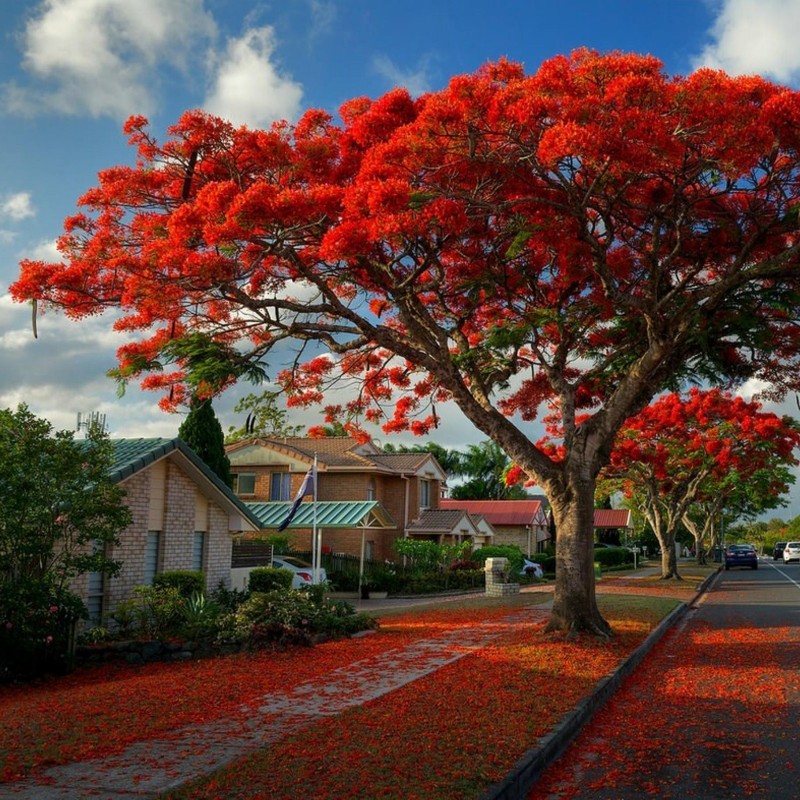











Delonix regia is a species of flowering plant in the family Fabaceae, subfamily Caesalpinioideae. It is noted for its fern-like leaves and flamboyant display of flowers. In many tropical parts of the world it is grown
Delonix regia is a species of flowering plant in the family Fabaceae, subfamily Caesalpinioideae. It is noted for its fern-like leaves and flamboyant display of flowers. In many tropical parts of the world it is grown as an ornamental tree and in English it is given the name Royal Poinciana or Flamboyant. It is also one of several trees known as Flame tree.
In India it is known as Gulmohar in Hindi. It is also known there as Krishnachura or Krusnachuda (Bengali/Oriya: crown of the Krishna) and Krishnasura (in Assamese and Bengali). In Kerala, it is known as Kaalvaripoo (കാൽവരിപ്പൂവ്). In Vietnam, it is known as Phượng vĩ (means "Phoenix's Tail) (Vietnamese), Malinche, and Tabachine.[1] In Khmer, the tree and the flower is known collectively as "Peacock" or ដើម (tree) or ផ្កា (flower) «ក្ងោក»។ . In Guatemala, Antigua Guatemala, it is known as llama del bosque and in Paraguay as chivato, in Cuba as flamboyán (taken from the French flamboyant).
This species was previously placed in the genus Poinciana, named for Phillippe de Longvilliers de Poincy, the 17th century governor of Saint Christophe (Saint Kitts). It is a non nodulating legume.
Description
The tree's vivid red/vermilion/orange/yellow flowers and bright green foliage make it an exceptionally striking sight.
The Delonix Regia is found in Madagascar's dry deciduous forests. In the wild it is endangered, but it is widely cultivated elsewhere. In addition to its ornamental value, it is also a useful shade tree in tropical conditions, because it usually grows to a modest height (mostly 5 meters, but it can reach an maximum height of 12 meters) but spreads widely, and its dense foliage provides full shade. In areas with a marked dry season, it sheds its leaves during the drought, but in other areas it is virtually evergreen. Flowers appear in corymbs along and at the ends of branches. Pods are green and flaccid when young and turn dark-brown and woody.
The flowers are large, with four spreading scarlet or orange-red petals up to 8 cm long, and a fifth upright petal called the standard, which is slightly larger and spotted with yellow and white. The naturally occurring variety flavida has yellow flowers.[2] Seed pods are dark brown and can be up to 60 cm long and 5 cm wide; the individual seeds, however, are small, weighing around 0.4 g on average. The compound leaves have a feathery appearance and are a characteristic light, bright green. They are doubly pinnate: Each leaf is 30–50 cm long and has 20 to 40 pairs of primary leaflets or pinnae on it, and each of these is further divided into 10-20 pairs of secondary leaflets or pinnules.
Cultural significance
In the Indian state of Kerala, Royal Poinciana is called Kaalvarippoo which means the flower of Calvary. There is a popular belief among Saint Thomas Christians of Kerala that when Jesus was crucified, there was a small Royal Poinciana tree nearby his Cross. It is believed that the blood of Jesus Christ was shed over the flowers of the tree and this is how the flowers of Royal Poinciana got a sharp red color.
Propagation
The Royal Poinciana is most commonly propagated by seeds. Seeds are collected, soaked in warm water for at least 24 hours, and planted in warm, moist soil in a semi-shaded, sheltered position. In lieu of soaking, the seeds can also be 'nicked' or 'pinched' (with a small scissors or nail clipper) and planted immediately. These two methods allow moisture to penetrate the tough outer casing, stimulating germination. The seedlings grow rapidly and can reach 30 cm in a few weeks under ideal conditions.
Less common, but just as effective, is propagation by semi-hardwood cuttings. Branches consisting of the current or last season's growth can be cut into 30 cm sections and planted in a moist potting mixture. This method is slower than seed propagation (cuttings take a few months to root) but is the preferred method for ensuring new trees are true to form. As such, cuttings are a particularly common method of propagation for the rarer yellow-flowering variety of the tree.
Flowering season
Bangladesh: April–May
South Florida: May–June
Egypt: May–June
Vietnam: May–July
Caribbean: May–September
Indian Subcontinent: April–June
Australia: November–February
Northern Mariana Islands: March–June
United Arab Emirates: May–July
Brazil: November–February
Southern Sudan: March–May
Thailand: April–May
Philippines: April–May
Peru (coast): January-March
Zambia and Zimbabwe: October–December
Hong Kong: May–June
Mauritius: November–December
Israel: May–June
Adatlap